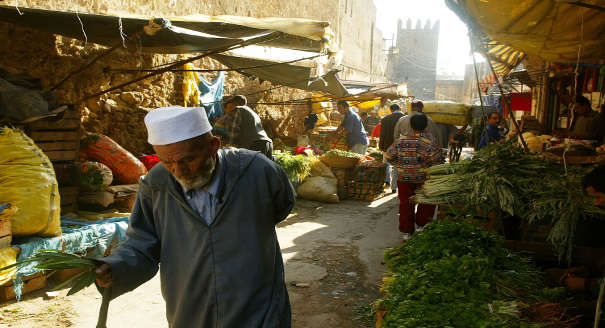Registration
You will receive an email confirming your registration.
IMGXYZ3809IMGZYXThe Arab Spring aroused historic economic and political expectations among populations in the Maghreb, but Morocco, Algeria and Tunisia continue facing tough economic times. Carnegie Middle East Center co-sponsored a conference with Sigma 21 on Maghreb Economies in Rabat, Morocco, to discuss the challenges facing the region. Carnegie Middle East Center senior scholar Lahcen Achy and United Nations economist Nassim Oulmane presented their findings on the present economic situation in Maghreb countries and suggested actions the Maghreb governments can take to promote future growth. Reuter’s journalist Souhail Karam moderated the discussion.
Arab Spring: Significance and Aftershocks
The Maghreb region is emerging from a unique and historical event, Achy asserted. Street activism has gained popularity as a means of demanding political rights and economic reforms, and its proven effectiveness in inciting regime change has placed heightened pressure on governments to respond.
Challenges
The long practiced rent-seeking model has negatively affected economic growth, job creation, and domestic and foreign investments throughout the Maghreb, the speakers said. The three countries are facing a period of slow growth, growing budget deficit, deteriorating current accounts, and accelerating inflation.
Morocco
- Educated Unemployed: Morocco’s rising unemployment rate, particularly among highly educated members of society, has ignited tensions and frustrations, Achy said.
- Trade Deficit: Morocco has typically been importing more than twice the value of its exports, reflecting the country’s low competitiveness and the failure of economic policies enacted to develop and diversify local industry, Achy said. The country relies on tourism revenues and remittances from Moroccan emigrants abroad to stabilize external accounts. The financial crisis’ negative impact on these sources of revenue and the rising costs of imports demonstrate the unsustainability of this model, Achy said.
- Infrastructure Investment: The government appears likely to reduce investment in infrastructure, education, and health sectors in order to reduce the budget deficit, but Achy warned that this would be an unwise and unpopular decision.
Algeria
- Bad Business Environment: The business environment in Algeria remains unpredictable and unwelcoming, explained Oulmane. Corruption is rampant, the private sector lacks financial backing, and the government recently enacted measures restricting foreign investment.
- Oil Dependency and Diversification: Hydrocarbon exports, principally to European markets, currently accounts for 97 percent of Algeria’s export revenues, Oulmane said. Though high oil and gas prices have made this very profitable, he emphasized that Algeria’s dependency on oil and gas exports was troubling both because that market was struggling and because of the government’s ineffective use of the profits.
- Youth Unemployment: Increasingly high levels of youth unemployment pose tremendous challenges to the country’s social stability and necessitate government investment in effective, job-creating industries, Oulmane added.
Tunisia
- Political Transformation: During its first year, the Ennahda-led Tunisian government has faced high expectations from its populace regarding its pre-existing economic challenges, Achy explained. The perception of the government as “in transition” negatively impacts its performance and perception from outside governments and agencies.
- Investment: Private sector investment, a primary engine for economic growth and job creation, currently stands at 15 percent, while in other emerging countries the average is 25 percent, Achy added. Low transparency has also led rating agencies to downgrade Tunisia’s ratings, which translate to higher borrowing costs for business.
- Highly Specialized: Tunisia’s economy is specializes in low value-added manufacturing and services and is heavily reliant upon the European market. The country needs to broaden its productive spectrum and diversify its markets, Achy warned.
Looking to the Future
Morocco and Tunisia have both made significant efforts to reform their regulations and promote domestic and foreign investments, the speakers agreed, while Algeria still has a long way to go. The crucial step for all three countries is to attract investment in innovative, high value-added sectors that would boost economic growth and create attractive jobs for the Maghreb’s labor force. To achieve this, the speakers said that Maghreb governments must improve their governance, make their institutions more transparent and effective, and alleviate existing tension in the economic and political climate. Given the historic context and the wealth of reforms that have yet to be made, Achy and Oulmane agreed that the future of the region remains unpredictable.
